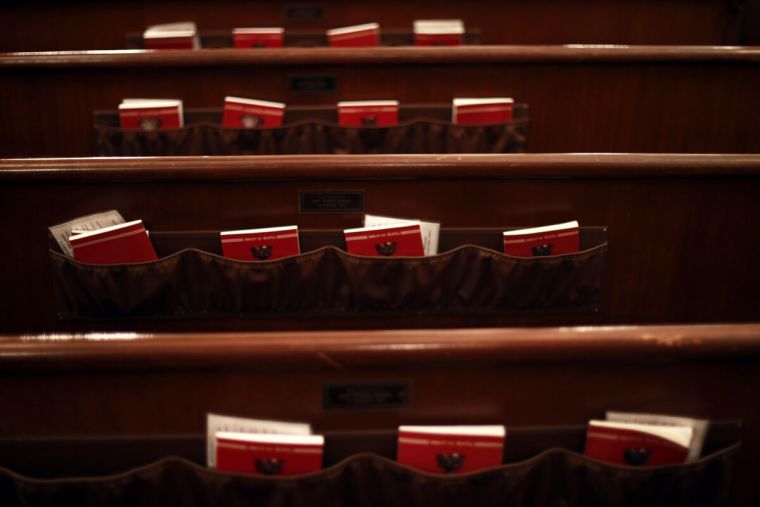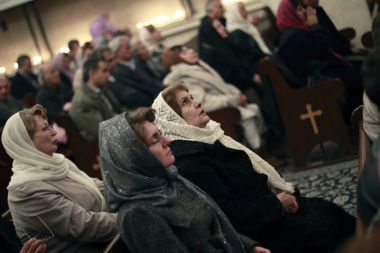Which country has the fastest-growing church in the world?

Christians in Iran face relentless persecution. Ranked ninth on Open Doors' list of countries where it's most dangerous to be a Christian, open churches are forbidden and converting from Islam – the state religion – is punishable by death for men, and life imprisonment for women. Last year more than 100 Christians were arrested or imprisoned and allegations of torture have emerged.
And yet, the church in Iran is thriving.
In 2015, mission organisation Operation World named Iran as having the fastest growing evangelical population in the world, with an estimated annual growth of 19.6 per cent. According to Mark Howard of Elam Ministries, an organisation founded by Iranian church leaders with the purpose of expanding the church in Iran, more Iranians have become Christians in the last two decades than in the previous 13 centuries combined.
"In 1979, there were an estimated 500 Christians from a Muslim background in Iran," he says. "Today, there are hundreds of thousands – some say more than one million. Whatever the exact number, many Iranians are turning to Jesus as Lord and Saviour."
So what's causing this growth?
The problems for Iranian Christians began in 1979. The Iranian revolution of that year resulted in the creation of a hard-line Islamic regime with a very strict interpretation of Shia Islam. Since then religious minorities, including Christians, Baha'is and Sunni Muslims, have been targeted by successive governments.
"Religious minorities are generally viewed with suspicion and treated as a threat to the regime," a country expert told Christian Today.
The source, a researcher for religious freedom charity Christian Solidarity Worldwide (CSW), who remained anonymous for security reasons, said minorities regularly face harassment, imprisonment, torture and even death.
Article 23 of the Iranian constitution states that "the investigation of an individual's belief is forbidden and no one may be molested or taken to task simply for holding certain beliefs", but the reality for religious minorities is very different.
"Iran considers the Twelver school of Islam the official religion of the country, and therefore adherents to different sects or faiths are usually discriminated against," the source said. "The Iranian Constitution recognises Christians, Jews and Zoroastrians as protected religious minorities, but the government has designed and continues to use special religious laws to oppress reformers, political activists, human rights defenders and religious minorities. So although religious freedom is somehow protected in the constitution in theory, in practice this doesn't happen."
Under President Hassan Rouhani, human rights violations – including the right to freedom of religious belief – have rapidly deteriorated. Iran executes more people per capita than any other country in the world, and a large proportion of those executed belong to religious minority groups.
In total, around 120,000 people are believed to have been executed since 1981 for their political or religious beliefs, 2,500 of whom have been hanged since Rouhani came to power in 2013. He promised to protect human rights and equality for all citizens of Iran, but has ostensibly failed to do so.
Campaigners have regularly urged international governments to hold Iran to account over its human rights violations, but so far feel their voices have gone unheard. Of particular contention was the absence of any mention of the worsening climate from Iran's landmark nuclear deal with the US secured last year.
This was "absolutely a failure," CSW's researcher said. "Because of that deal, Iran was able to get hold of a huge amount of funds – after the lifting of the sanctions, lots of Iranian money and assets that had been frozen were made available to the authorities. We're talking about billions of dollars. That deal has made it much easier for the Iranian regime to continue its unacceptable and appalling behaviour towards religious minorities, and not only religious minorities, but to all Iranian people, because they are held hostage by this religious dictatorship."

President Obama received particular criticism for having failed to use the nuclear deal to secure the release of jailed US citizens in Iran, including Saeed Abedini – a high profile case that saw the Christian pastor become a poster child for religious freedom activists, and especially among the religious right in America.
He was eventually released as part of a prisoner swap in January this year, but his imprisonment and torture in Iran is not a unique case, and many more Christians remain behind bars. His colleague Maryam Naghash Zargaran is currently serving a four-year sentence in connection with her work at an orphanage alongside Abedini.
Christians in Iran typically face charges including actions against national security or espionage – that was the case with Pastor Saeed. Other typical allegations include enmity of God, apostasy and blasphemy. "These are the usual charges used by Iranian authorities to crackdown on religious freedom and freedom of speech in general," the CSW researcher said.
These allegations are usually "totally fabricated", he added. Judges have a list of "standard charges that... [they] pick and choose from". In some cases, the source said, the intelligence services order judges to choose a particular charge to suit their intentions. The whole process is controlled by the security services, an am of the government which is "heavily influenced by the clerical establishment".
Not all Christians end up in jail, of course, but just living as a Christian in public is "difficult and intimidating," the source said. They regularly face having their property confiscated, and some have even been arrested for using wine during Communion. Christians from a Muslim background face especially harsh punishments.
"It is dangerous and unpredictable," the source said. "You never know when the security services might arrest you, and you never know what you could be charged with."
Within that context, the growth of Iran's Christian population is remarkable. Though it is difficult to measure because of restrictions put in place by the regime, "Iranians are becoming Christians in their thousands, so I would say yes – it probably is the fastest growing church in the world," CSW's researcher said.
This growth isn't limited to Iran. The church is also growing within the Iranian diaspora – in countries such as the UK, the USA, Turkey, Germany and Canada – where Iranian Christians are very active through media. There are a number of satellite TV channels that broadcast the gospel message in Farsi, which has led the Iranian government to crackdown on citizens with satellite receiver dishes.
The source attributed this rapid growth to the difficulties Christians in Iran face.
"Historically, the church flourishes in times of persecution and danger, and Iran is definitely a place of persecution for the church, so it's not a surprise for me that the church is growing in Iran," he said.
"Another factor would be the ugly image that the Mullah regime has given about Islam. With all the restrictions on freedom of speech, women's rights, violence, cracking down on human rights and journalists, it all gives a very unpleasant image about Islam, so this probably triggered lots of Iranians, especially younger generations, to search for an alternative, to search for the truth, and to question Islam."
The future of the church in Iran, he says, looks bright.
"The Iranian church will continue growing and eventually Iran will open up. They cannot keep going like this forever – they have to [open up]. If they want to be accepted and integrated within the international community then they have to introduce changes, and once they start introducing changes, the whole structure will crumble down. One thing will lead to another."
He continued: "It is our human nature to seek freedom and freedom of speech, religion and belief, and to be open to the outside world. I think the process may take time, and may be a long one, but I am sure that this will happen... and the church will be victorious in the end."











